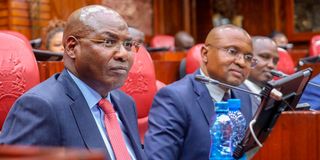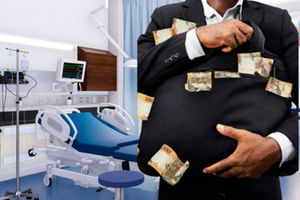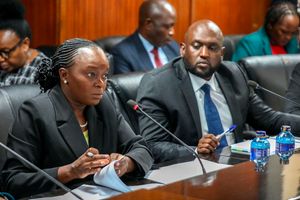
Principal Secretary State Department for Medical Services Harry Kimtai and Social Health Authority Ag CEO Robert Ingasira (Right) before the National Assembly Departmental Committee on Health chaired by Dr Robert Pukose at County Hall Nairobi on Monday, February 10, 2025.
The Social Health Authority (SHA) inherited from the National Health Insurance Fund (NHIF) Sh43 billion in debts to healthcare providers and co-insurers, according to Medical Services Principal Secretary Harry Kimutai.
Mr Kimtai, while appearing before the Health Committee of the National Assembly, stated that the delayed payment of premiums by various ministries and agencies has interrupted services in public and private hospitals, with Kenyans being turned away unless they pay out of pocket.
The PS told the committee that the Emergency, Chronic and Critical Illness Fund under SHA, which is funded by the government, is yet to be fully activated, with services only limited to specific emergency services that include resuscitation and stabilisation for the first 24 hours. The revelations saw members of the committee chaired by Endebess MP Robert Pukose raise concerns on the viability of the fund.
The debts, the PS said, are as a result of State agencies’ failure to remit over Sh25 billion in premium amounts to the SHA.
“The delayed payments have disrupted service provision and placed pressure on both public and private health institutions relying on timely reimbursements,” said PS Kimtai.
This means that until the National Treasury releases the funds to SHA, Kenyans, specifically those who cannot afford expensive medical care, will continue to suffer.
The Ministry of Public Service tops the list of defaulters to SHA with Sh15.54 billion in outstanding premiums as at January 8, followed by the Ministry of Health at Sh8.4 billion and the Ministry of Interior at Sh1.64 billion.
Work Injury Benefits Act
The various schemes under the Public Service ministry whose premiums have not been paid include the civil servants Work Injury Benefits Act (Wiba) Sh8.14 billion, Wiba prior to April 2021 claims (Sh3.93 billion) and medical cover (Sh3.47 billion).
The unremitted premiums under the Ministry of Health include Universal Health Care (UHC) for indigents at Sh4 billion and Linda Mama at Sh2.12 billion. There is also the Health Insurance Subsidy Programmes for Orphans and Vulnerable Children (Sh1.42 billion), for Older Persons and Persons with Severe Disability (Sh289.5 million) and primary health care Sh375 million.
“SHA has been engaging the various government agencies with a view to recover the outstanding debts owed to NHIF to facilitate payment of debts owed to providers by SHA,” said Mr Kimtai.
Although the Emergency, Chronic and Critical Illness Fund is exchequer funded, Mr Kimtai said that due to the current financial year funding limitation, the chronic and critical illness components of the fund, whose services are available in all level 2 to 6 facilities for all Kenyans, are not yet activated.
Dr Pukose wondered why the PS was claiming Sh200 million in unremitted amounts for the Emergency, Chronic and Critical Illness Fund despite stating that total claims to the fund stood at Sh21.6 million.
“We are not agreeing with you on the total claims for the Emergency, Chronic and Critical Illness Fund,” said Dr Pukose as he demanded that the PS clarifies the variance. Mr Kimtai agreed to provide an elaborate explanation.
Allocated Sh2 billion
In the current financial year, Parliament allocated Sh2 billion towards the fund, but the PS told the committee that only Sh21.6 million have been registered in claims so far with MPs questioning why the fund should get so much money yet the absorption is low.
The reliability of the SHA system has been a concern as frequent downtime has resulted in patient frustrations.
SHA, which came up following the repeal of the NHIF Act, operates three funds. There is the Primary Healthcare Fund that is accessible in levels 2, 3 and some 4 facilities for outpatient services at no cost if registered as a member or dependent.
There is the Social Health Insurance Fund, which is funded by the 2.75 per cent contribution by those who are gainfully employed. Once paid-up, beneficiaries can receive treatment from levels 4, 5 and 6 hospitals.
The Emergency, Chronic and Critical Illness Fund caters for urgent care for specific services as per the gazetted benefits package.









